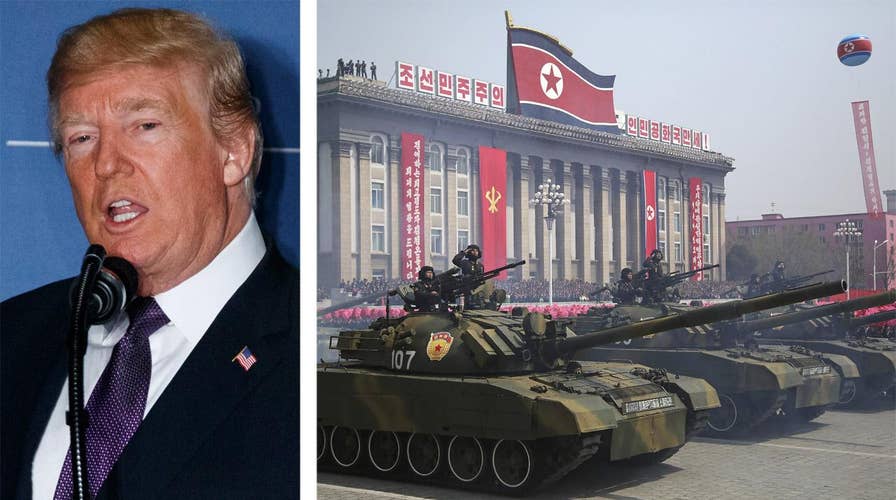Will Trump's North Korea move be a foreign policy triumph?
Trump's agreement to meet with Kim Jong Un draws positive reactions and criticisms; Fox News contributor Dr. Kiron Skinner provides insight on 'The Ingraham Angle.'
Picture this: thanks to a combination of diplomatic ingenuity, unique personalities and a historic willingness to see tensions in Northeast Asia disappear, President Donald J. Trump convinces North Korean dictator Kim Jong Un to do the unthinkable and give up his nuclear weapons.
While we are a long way from even a meeting between the two taking place, let alone the ending of Kim’s nuclear weapons program, we can stargaze a little. If the Trump administration can somehow land the ultimate of deals, the geopolitical map would instantly be reset. America’s security, and that of its allies in Asia, would be enhanced dramatically, ridding our planet of one of its greatest security risks. Not only would President Trump deserve the Nobel Prize, but his place in history would be secure—forever.
And nothing would terrify China more. The reason, if you think about it, is obvious. The instability that Pyongyang brings to U.S. foreign policy presents to China a once-in-a-lifetime opportunity to achieve many of its goals throughout the Indo-Pacific region. Remove the North Korea crisis from Asia and Washington has the economic, diplomatic, political and, most of all, military bandwidth to contain Beijing’s aspirations across Asia—and indeed, around the world.
To be clear, China has benefitted in the past from America having its diplomatic focus elsewhere. Just months before September 11, in April 2001, Washington and Beijing saw tensions spike after Chinese fighter pilots damaged a U.S. intelligence plane flying in international airspace. The so-called Hainan Island Incident caused Washington to begin to rethink its relations with Beijing, at least for a time. But after the towers fell on September 11 and America went to war against terror around the world, China was able to build its economic and military muscle while the world was focused on events elsewhere.
Just a simple spin of the globe shows Beijing would stand to lose momentum in many key areas if Washington was again able to refocus on its great-power competition with the middle kingdom, something it has set forth as a goal in the recent U.S. National Security Strategy. Best of all, America would no longer feel indebted to China for its help on the North Korea nuclear challenge.
Best of all, America would no longer feel indebted to China for its help on the North Korea nuclear challenge.
Just a short sample of the areas where Washington could finally push back on China with greater force would include:
- South China Sea. America would finally be able to develop a fine-tuned approach to pushing back against Chinese aggression in the South China Sea, where Beijing has built several man-made islands that help ensure that in the next few years it would dominate that vital near-sea. With trillions of dollars of seaborne trade passing through this body of water and potentially trillions more in natural resources under the waves, America could finally challenge China’s claims from a true position of strength.
- Taiwan. Washington would also be able to fully assist Taiwan—a democracy of 25 million who is in constant fear of being absorbed by China—to get the diplomatic, economic and military freedom it needs to ensure its survival. Over the last few years, Beijing has done all it can to chip away at Taipei’s relations with other nations, stage dangerous military maneuvers around the island nation and constantly threaten its very existence. Being freed of the North Korea challenge, Washington would have the ability to enhance ties with Taiwan considerably, and offer it greater diplomatic and military aide—all but ensuring that Taipei would preserve its unique place as the showcase of what a Chinese democracy could look like in the future.
- East China Sea. America and Japan could finally push China back in the East China Sea, a region in East Asia where Beijing has been aggressively trying to dominate vital sea lanes and islands. While Washington has made it clear that any attempt by China to capture the disputed Senkaku Islands from Japan would trigger American security guarantees to Tokyo, being freed of the North Korea crisis would give that statement some major teeth. Washington could dedicate the full-power of its Asian military assets into the East China Sea in a crisis—and that means big trouble for Beijing.
- Trade. America’s $350 billion trade imbalance with China could also finally be addressed, as the necessary political and diplomatic bandwidth would finally be available. While some of this imbalance is indeed structural and part of a global supply change that sees cheap Chinese labor build many of the things Americans need daily, Washington would have the wiggle room to press Beijing on this issue—something that has cost America countless jobs.
But, as they say, we can’t put the cart before the horse just yet. Much needs to transpire between now and a potential meeting by the end of May. However, if President Trump can land the biggest diplomatic deal on the planet, Washington could very well knock out two big problems at the same time. And the world just might not be the same. Now that is something worth striving for.









































